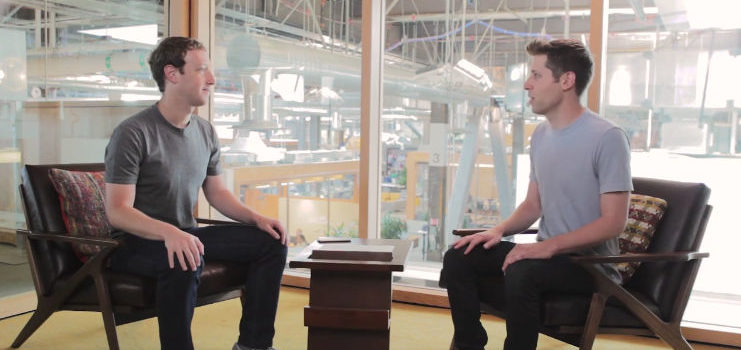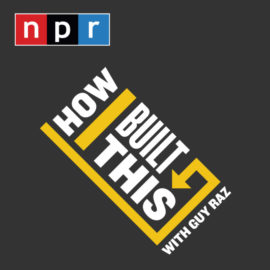

A great interview with Mark Zuckerberg and Sam Altman on building Facebook. Watch the video here and read a full transcript on TheMacro.
Early Days of Facebook
- studied psych in college. So much of brain structure and activity governs how to interface with people. It’s an important thing in our lives.
- the thing that mattered most to people was other people, and the Internet at the time didn’t serve this well
- Zuck wanted to build tools that helped people learn more about each other’s lives and build 10+ products around this theme. One example, Coursematch, let people share what courses they were taking
Did you think Facebook was going to be a big company?
- no, they built it to be a useful tool to start. Didn’t think about turning it into a company
- after they launched the first version, they actually said, “someday there will be a company that will do what we’re doing.” Didn’t even think about their tool as a company
What made Facebook different from the other products that he built that made it take off?
- people loved it with clear intensity. Within couple of weeks, 2/3 of Harvard students were using it, neighboring schools like MIT were clamoring to get in
- the other products like CourseMatch basically served their purpose
Advice to give to people who want to build products?
- start with the problem you want to solve in the world, don’t start with wanting to build a company
- the best companies try to drive social change in their local sphere
- many people want to start a company before figuring out what they want to do – this feels backward
- what gets you through the hard times is believing what you’re doing
Low Points in Facebook
- Yahoo offered to buy FB for $1 billion in summer 2006
- this was a turning point. Before then, they knew what they had to do – keep expanding, adding features
- FB had 10 million users at the time. It wasn’t obvious they were going to succeed far beyond this
- the size of the offer caused a lot of internal discussions about the future. They built a vision around connecting the world. The value of this vision needed to be bigger than $1 billion, and this forced the conversation.
- a lot of people thought they should sell the company. When hiring, Zuck wasn’t good at communicating his mission of connecting all these people. A lot of people who joined early on wanted to see an exit
- after turning down the offer, the management team left within a year because they couldn’t agree with the decision and the mission
- luckily within a few months after this refusal, they were on track with their mission – they launched News Feed, opened up to all people
How do you decide what to build?
- build a company that is focused on learning as quickly as possible
- FB invested in a huge testing framework to run tens of thousands of tests simultaneously
- you make so much more progress by empowering people to run their own experiments and prove value with data, than if you bottleneck decisions on management
- so build a learning culture
How do you make a large bet like acquisitions or a big new product?
- if you do stuff well, you shouldn’t have to do big crazy things
- you want to evolve in steps with your community by listening to what problems they have
- News Feed was a large shift, but this was actually years in the making by observing how people were using FB
- before this, people just clicked through hundreds of profiles to see what people had changed
- at first, just had a simple version that listed friends who had recently updated their profiles
- use data and qualitative feedback from users to tell you what problems to solve. Then use intuition to create solutions. Then test hypotheses and use data to decide where to go
- Oculus was a big acquisition, but if they had done a better job of building it internally, they wouldn’t have had to acquire
You’ve said one of the best things FB did was building a growth group. Is this still advice you’d recommend?
- the value was big
- the traditional approach of growing is to have a comm and marketing team, buy ads
- but if you want to grow a product, the best levers are within the product itself
- there’s no magic in the growth group. It’s just being rigorous with data and process experiments
- (one famous goal of the growth team: add 7 friends within 10 days)
How have you hired the team?
- people commonly think experience is really important. But I started FB at 19, so experience can’t be that important
- focus on people who are talented
- how do you tell they’re talented? Look at what they’ve done – side projects, previous work. Don’t have to believe they’ve specifically done the job you’re hiring them for
- give people who work at your company a lot of opportunity
- Zuck is proud of this: Facebook has 12 product groups reporting to him. All but one of them are led by people who started off not running a product group or reporting to Zuck
- exception is David Marcus
- giving opportunities helps recruiting and culture
What are you most excited about over the next 20 years?
- 10 year roadmap: 1) Internet connectivity worldwide, 2) AI, 3) VR/AR
- AI: there’s a lot of problems to solve here. e.g. a skin cancer diagnosis app has the accuracy of the best dermatologists in the world. Now every doctor can be the best dermatologist in the world
- fearmongering around AI is frustrating. AI is going to save a ton of lives
- VR/AR is a new computing platform is going to help people be more creative, help experience what other people are experiencing more immersively
- AI: there’s a lot of problems to solve here. e.g. a skin cancer diagnosis app has the accuracy of the best dermatologists in the world. Now every doctor can be the best dermatologist in the world
How do you advise people who are 19 today?
- pick something you care about and work on it, but don’t commit to turning it into a company until it’s working
- otherwise you get locked into a local maxima
- Dustin and Zuck’s original plan was to go back to school
Best piece of advice Peter Thiel has ever given you?
- in a world that’s changing so quickly, the biggest risk you can take is not taking any risk
- some risky moves locally may have downside, but if you’re stagnant in the long run, you’re guaranteed to fail

